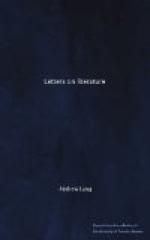Why Mr. Browning is obscure is a long question; probably the answer is that he often could not help himself. His darkest poems may be made out by a person of average intelligence who will read them as hard as, for example, he would find it necessary to read the “Logic” of Hegel. There is a story of two clever girls who set out to peruse “Sordello,” and corresponded with each other about their progress. “Somebody is dead in ‘Sordello,’” one of them wrote to her friend. “I don’t quite know who it is, but it must make things a little clearer in the long run.” Alas! a copious use of the guillotine would scarcely clear the stage of “Sordello.” It is hardly to be hoped that “Sordello,” or “Red Cotton Night Cap Country,” or “Fifine,” will continue to be struggled with by posterity. But the mass of “Men and Women,” that unexampled gallery of portraits of the inmost hearts and secret minds of priests, prigs, princes, girls, lovers, poets, painters, must survive immortally, while civilization and literature last, while men care to know what is in men.
No perversity of humour, no voluntary or involuntary harshness of style, can destroy the merit of these poems, which have nothing like them in the letters of the past, and must remain without successful imitators in the future. They will last all the better for a certain manliness of religious faith—something sturdy and assured—not moved by winds of doctrine, not paltering with doubts, which is certainly one of Mr. Browning’s attractions in this fickle and shifting generation. He cannot be forgotten while, as he says—
“A
sunset touch,
A chorus ending of Euripides,”
remind men that they are creatures of immortality, and move “a thousand hopes and fears.”
If one were to write out of mere personal preference, and praise most that which best fits one’s private moods, I suppose I should place Mr. Matthew Arnold at the head of contemporary English poets. Reason and reflection, discussion and critical judgment, tell one that he is not quite there.
Mr. Arnold had not the many melodies of the Laureate, nor his versatile mastery, nor his magic, nor his copiousness. He had not the microscopic glance of Mr. Browning, nor his rude grasp of facts, which tears the life out of them as the Aztec priest plucked the very heart from the victim. We know that, but yet Mr. Arnold’s poetry has our love; his lines murmur in our memory through all the stress and accidents of life. “The Scholar Gipsy,” “Obermann,” “Switzerland,” the melancholy majesty of the close of “Sohrab and Rustum,” the tenderness of those elegiacs on two kindred graves beneath the Himalayas and by the Midland Sea; the surge and thunder of “Dover Beach,” with its “melancholy, long-withdrawing roar;” these can only cease to whisper to us and console us in that latest hour when life herself ceases to “moan round with many voices.”
My friends tell me that Mr. Arnold is too doubting, and too didactic, that he protests too much, and considers too curiously, that his best poems are, at most, “a chain of highly valuable thoughts.” It may be so; but he carries us back to “wet, bird-haunted English lawns;” like him “we know what white and purple fritillaries the grassy harvest of the river yields,” with him we try to practise resignation, and to give ourselves over to that spirit




